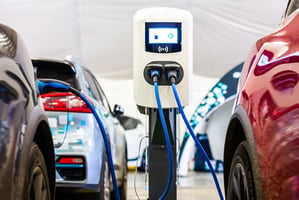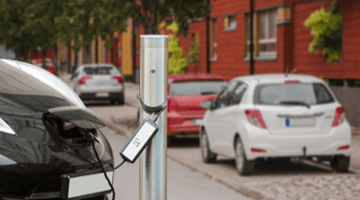Have you thought about purchasing an electric vehicle for your next car? There is a lot of talk,...
Is This the Year to Go Electric (Vehicle)?
 As of August 2021, the United States has set a target goal that 50% of all new vehicle sales be electric by 2030. That's a giant leap. If you've been thinking about making the switch, here are some things to consider in your decision whether this is the year to go electric.
As of August 2021, the United States has set a target goal that 50% of all new vehicle sales be electric by 2030. That's a giant leap. If you've been thinking about making the switch, here are some things to consider in your decision whether this is the year to go electric.
Where are We Now?
Tesla introduced the first modern all-electric commercial vehicle in 2008, and in 2020 sold just shy of a half-million electric cars. By the late fall of 2021, that number surpassed 2 million. To say the electric vehicle phase of automobiles is taking hold is not an overstatement.
The Pros of Owning an Electric Vehicle
It's easy to see the benefits of this growth in reducing our dependency on fossil fuels and preserving the environment. In addition, no longer needing to purchase gas for the daily commute would profoundly change America. Automobile manufacturers worldwide are investing in more electric cars, and the trend is expected to continue. EV owners report that they love the smooth ride, the quiet operation, and the reduced need for maintenance without fluids to change and parts to replace.
What are the Cons of Owning an Electric Vehicle?
Price: Upfront, the cost of an EV could run a bit high – think $40k or more. There are lower-priced models, and some are much higher. When considering cost, one would do well to add up annual gasoline expense and lower maintenance costs and factor the omission of those into the total budget.
Charging: Even at the fastest charging level, charging an EV takes longer than filling a gas tank. It helps to plan ahead and know where you can charge while you do other things. However, finding a charging station isn't always easy or convenient. One of the problems stems from utility regulations that prevent fuel stations from profiting from electrical charging. As a result, one of the most important things an electric vehicle owner needs is a dedicated charging station.
The Battery: EVs operate on lithium-ion battery packs vs. the lead-acid car batteries we now take for granted. The battery pack will need replacing at some point. The cost will run upward of $5K. The life expectancy of the original battery is eight years to as many as 20 years or 100,000 miles. How much do you spend on gas and motor oil in 8 - 20 years? Some EV manufacturers are offering generous warranties on battery life or replacement, so explore those options as you make your buying decision.
Electric Vehicle (EV) Charging Station Installation
Having a dedicated EV charging station is essential to fully appreciate the battery-operated vehicle’s benefits. Even if you do not have a garage, you need to have a way to keep your vehicle charged. Accessibility at home is critical, primarily when other charging stations are not conveniently located.
Wilcox Electric doesn't just install EV charging stations; although we are experts, we install with creativity. Because we have been your local DC electrician for 30 years, you already know we understand the electrical side of everything else in your home, so you can trust our same expertise to install your charging station creatively. Even if you don't have a garage, Wilcox can find a way to perform Level I and Level II installations safely.
In addition to private residences, Wilcox does installations for commercial buildings and residential complexes, as more building owners appreciate the benefits of being energy-friendly and convenient for clients, employees, and residents.



